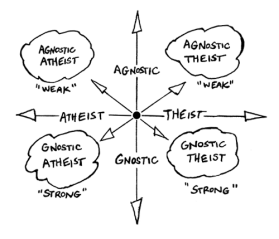AGNOSTICISM: A state of mind defined literally as "lack of spiritual knowledge"

Agnosticism is a term coined by Thomas Huxley in the late 1800's to describe the experience of "not knowing" as it relates to spiritual and metaphysical principles.
"Gnosis" comes from the Greek word meaning spiritual knowledge of a saint or mystically enlightened human being (en.wikipedia.org/wiki/Gnosis).
An agnostic is simply someone who lacks this type of knowledge or experience.
Huxley's proposal does not mean that such knowledge is impossible, only that someone who lacks spiritual knowledge through experience is limited to the realm of belief, and therefore cannot make claims that what they believe is also true.
The metaphysical understanding of the human mind as "one mind appearing as many" leads to the awareness that any one conscious perspective or point of view may experience any one of the infinite possibilities when it comes to spiritual knowledge.
In simple terms, this means it is entirely possible for one individual to have a deep spiritual "knowing" or experience, while another perceives the same Universe using only the five physical senses.
This does not make one "right" and the other "wrong". It is the nature of a polarized, dualistic Mind creating the experience of all possibilities.
While one may experience "gnosis" and cannot understand why another does not see the "truth"; and another is "agnostic" and honestly claims to "not know"; perhaps it is wise and best to simply acknowledge that both possibilities do in fact exist side by side.
Making room in one's mind for all that exists leads to peace and well being, resulting in better health and relationships - certainly a worthwhile application of metaphysical knowledge.
For more history, definitions, and information explore the links and video below.
OR, Go Back To: Philosophy of Metaphysics to learn more about the nature of knowledge and belief.
A Definition from Answers.com
Agnosticism (Greek: α- a-, without + γνώσις gnōsis, knowledge; after Gnosticism) is the philosophical view that the truth value of certain claims — particularly metaphysical claims regarding theology, afterlife or the existence of deities, spiritual beings, or even ultimate reality — is unknown or, depending on the form, inherently impossible to prove or disprove and hence unknowable. It is often put forth as a middle ground between theism and atheism,[1] though it is not a religious declaration in itself and the terms are not mutually exclusive. Agnosticism refers to knowledge, while atheism and theism refer to belief.[2]
Overview of the Definition: on About.com
Agnosticism & Thomas Henry Huxley:
The term was coined by Professor Thomas Henry Huxley (1825-1895) at a meeting of the Metaphysical Society in 1876. For Huxley, it was a position which rejected the knowledge claims of both 'strong' atheism and traditional theism. More importantly for him it was a method of doing things. Read More...

"Agnosticism" by Robert Flint: Read Online, or Download PDF.
Nature, origins and history...Huxley, Hume, and Kant...
Read the book online at google books, or download the full PDF version.
Watch an excerpt from a lecture by Eugenie Scott of the National Center for Science Education on Intelligent Design and the controversy over Evolution and Creationism. The full lecture can be seen at Youtube on The Research Channel.
NOTE: The opinions expressed before and after the lecture excerpt are those of the producer and may or may not reflect the opinions of Heartcompass Enterprises and Metaphysics for Life.

Watch A Mind With Heart Channel on Youtube. The official Youtube Channel for Metaphysics For Life!
OR, Go Back To: METAPHYSICS FOR LIFE: TAKE THE OFF RAMP to return to the "HOME" page and continue exploring this site.
Recent Articles
-
Living In The Chrysalis - 14 "Days" of Total Transformation
Aug 25, 20 10:26 PM
Living In The Chrysalis is about the 14 "Days" of Total Transformation that collective Human Consciousness is experiencing in 2020 and beyond. -
The Zero Point Perspective
Jul 20, 20 01:04 PM
Reality is made up of infinite zero points radiating energy and information into the space-time of the mind. -
Metaphysics For Life - Take the Off-Ramp, Remember Who You Really Are
Jan 03, 20 01:15 PM
Metaphysics for Life is for practical people looking for a way to apply the science, philosophy, and spiritual aspects of metaphysics to their real, everyday lives.








Comments
Have something to say about what you just read? Leave me a comment in the box below.